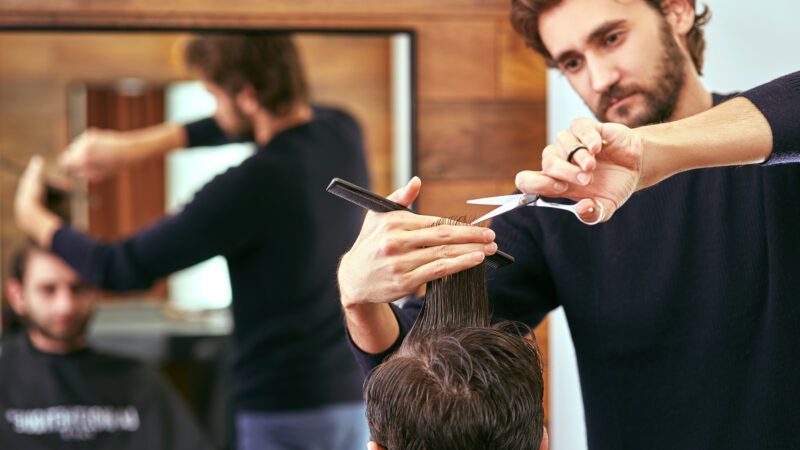Study Finds Occupational Licensing Laws Depress Wages in Other Industries
A Cato Institute policy brief found that while licensed occupations see a nice bump in pay, licensing requirements lower wages for other similar occupations.

Depending upon where you live and what you do for a living, state or local laws may require you to get a license to operate in your chosen field.
A research brief released last week by the Cato Institute found that while such occupational licensing laws raise wages in affected industries, they also depress wages in other similar industries that don't have the same requirements.
The paper's author, Samuel Dodini of the Norwegian School of Economics, "compare[d] the earnings of similar workers in similar occupations in local labor markets that arbitrarily face different licensing requirements depending on which side of a state border they reside in"—for example, one state may require licenses for a particular job, while an adjoining state may not, allowing for an easy comparison. Dodini also examined "whether effects differ between groups of workers, particularly by gender, race/ethnicity, and nativity."
"Consistent with prior research, my study finds an average earnings premium of approximately 8 percent in occupations required to have a license in their state relative to the same occupation without a licensing requirement on the other side of a state border," Dodini concluded. "Conversely, my study finds that a 10 percentage point increase in the share of licensed workers with similar skills is associated with earnings that are 1.6–2.3 percent lower for all occupations."
Worse, "these negative effects are stronger for female, non-Hispanic black, and foreign-born Hispanic workers and are most concentrated in industries outside agriculture, manufacturing, and mining."
The evidence has been clear for some time that occupational licensing artificially increases wages in a given field and keeps out qualified applicants. If a state requires you to pay $18,200 and take 1,500 hours of cosmetology classes before starting a hair removal business, you likely won't have many people signing up, and the established players can preserve their market share.
But Dodini's brief makes the case that licensing laws also depress wages in similar, nonlicensed fields. How?
"Consider a worker who can choose to work as a waiter or a barber," writes Dodini. "If being a barber requires a license (and being a waiter does not), then restaurants may be able to pay waiters less without concern they will quit to become a barber." If employees aren't satisfied with their jobs but their only alternatives are too expensive to consider, they may have to stay put—and their employers know it.
"My results suggest that for every extra $1.00 that a worker earns via the licensing premium of their own occupation, they lose approximately $2.23 via spillover effects from other licensed occupations," Dodini writes. On the other hand, "my estimates suggest that eliminating occupational licensing would reduce earnings inequality within occupations by 2–4 percent across various measures."
Again, these results are not new. "In the United States, nearly one in every four workers is licensed," according to a 2022 study by the Federal Reserve Bank of Minneapolis. But "workers of color are substantially less likely to be licensed relative to White, non-Latino/a workers," meaning non-white and Hispanic workers are less likely to qualify for higher-paying jobs. These results held true even when accounting for differences in level of education, as "white workers are overrepresented in licensed work across every level of educational attainment."
"The educational or training requirements for licensure in some occupations go beyond what would be typical in the absence of licensure and beyond what is necessary to protect public health and safety," that study found, citing sources as old as a July 2015 White House policy report.


Show Comments (8)